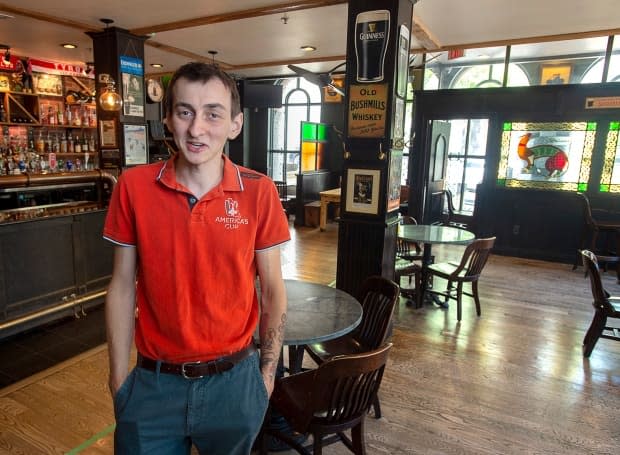Halifax bars, restaurants question new COVID-19 rules

Some Halifax restaurants are questioning the latest COVID-19 restrictions, with at least one taking dining rules a step further.
On Friday, the province announced new restrictions in the Halifax area to act as a circuit-breaker as case numbers moved higher. Four new cases were reported on Saturday, bringing the total of active cases to 39.
As of Saturday, restaurants and bars must stop serving food and drink by 9 p.m. and must close by 10 p.m. The rules will be in place for at least one month.
But Brendan Doherty, co-owner of the Old Triangle pub in downtown Halifax, said it seems like an "empty restriction" that won't accomplish much beyond hurting businesses during an already slow season.
"We do feel like something extra does need to be done at the moment, we do need to be more cautious," Doherty said. "And … there are many tools in the tool chest that could have been used.
"We decided to be proactive and put our heads together and say, 'You know, what can we do given the circumstances that actually gives a chance to help the situation we're currently in?'"
To go that extra step, the pub will limit the number of people allowed at a table to six, which is below the 10-person cap mandated by the province.
The business will be closed on St. Patrick's Day after Doherty said the government rejected a proposal for a pandemic-era plan on how to navigate the day.
The pub is also working to bring in a sick-day program, Doherty said, so staff that feel unwell and go to get a COVID-19 test will still be paid for their scheduled shift.
He said the move is important because this time of the year is always rough in the service industry, even without a global pandemic. Doherty said he doesn't want staff to feel financially obligated to come to work if they're not feeling well.

Dr. Robert Strang, the chief medical officer of health, has consistently asked Nova Scotians to stay home if they have any symptoms of the virus.
On Friday, Premier Iain Rankin said it's important to keep having discussions about paid sick days for people who need time off for testing. He said the point was raised when he reached out to speak with an opposition leader, but did not specify which one.
"I met with him to discuss options so that we can support our workforce," Rankin said during the COVID-19 briefing.
"It is something that we'll continue to discuss moving forward."
The Nova Scotia NDP proposed a bill last year that would have allowed all workers, unionized or not, to be able to accrue up to six paid sick days per year, an idea the Liberals rejected during the spring sitting at Province House.
Resources available now
There is a federal program, the Canada Recovery Sickness Benefit, which provides $450 after taxes per week for up to two weeks. But some critics, workers' advocates and public health professionals say the program is flawed, and is an insufficient replacement for having employers guarantee paid sick leave.
Doherty said he's not a health professional and doesn't know what the ideal plan would be to address the spread of COVID-19. But he suggested that zeroing in on travellers coming into the province, and big-box stores or businesses with far more customers in close proximity, might be more effective.
He added that he's heard from many other restaurant and bar owners about their disappointment with the lack of communication and collaboration with the province, which Doherty said is different from earlier in the pandemic.
Obladee, a wine bar in downtown Halifax, echoed that sentiment with a social media post on Saturday.
It called on the government to show its evidence to support the 9 p.m. restrictions, and pointed out that their industry was given less than 24-hours notice before the changes went into effect.
"Meaningful consultation with public stakeholders improves decision making and is a matter of transparency and fairness," the post said.
"These decisions have major impacts on the livelihoods of thousands of Nova Scotians. We can do better."
During Friday's briefing, Strang said cutting an hour of service is an attempt to balance public health risks while ensuring bars and restaurants can stay open.
Any setting where people are in close proximity for a long period of time, without masks, carries a "significant risk" of virus transmission, Strang said.
He said that the restriction sends a "very strong signal" that patrons need to limit their dining and drinking habits.
"The restaurants themselves are not problematic, they're doing a very good job," Strang said.
"But how the public are using the restaurants, the frequency, the going to restaurants [at] different times with different groups of people — the choices people are making when they go out to dine, is problematic."
MORE TOP STORIES
